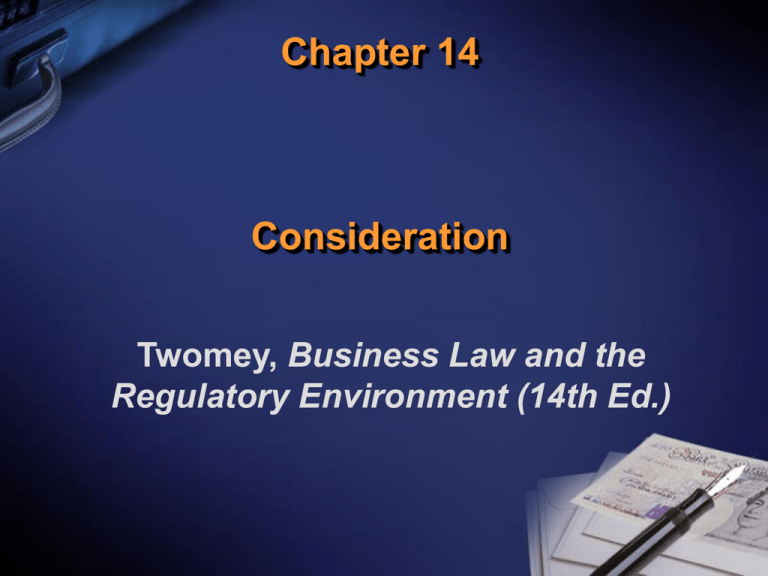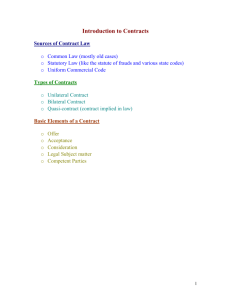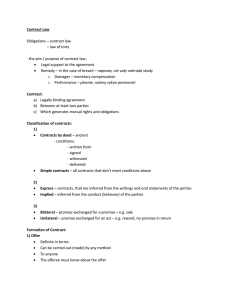Chapter 14 Consideration
advertisement

Chapter 14 Consideration Twomey, Business Law and the Regulatory Environment (14th Ed.) The Nature of Consideration [14-1] Contract for the sale of a Ford Torino by Jake Plumber to Tom Irvin for $1272 $1272 benefit detriment Jake Plumber detriment benefit Tom Irvin benefit Ford Torino Loan by Bank Two to Tom Irvin for purchase of Ford Torino Repayment of $1272 plus 8% interest detriment Bank Two Tom Irvin detriment benefit $1272 Gift of Ford Torino by Tom Irvin to his sister Becky, as a graduation gift none detriment benefit Tom Irvin detriment Ford Torino Becky Irvin benefi t A gift does not have consideration. A promise to make a gift is not enforceable. (c) West Legal Studies Chapter 14 2 Consideration and Promises Act Consideration as the Price Promise To Forbear To Act + The Promise Binding Exceptions to Consideration Charitable Subscription Uniform Commercial Code Sealed and Written Instruments Promissory Estoppel What Is Not Consideration Unrequested Benefit Promise to Perform Existing Obligation Moral Obligation Illegal Consideration (c) West Legal Studies Chapter 14 Not Binding 3 Chapter 14 Summary A promise is not binding if there is no consideration for the promise. Consideration is what the promisor requires as the price for the promise. That price may be doing an act, refraining from the doing of an act, or merely promising to do or to refrain. In a bilateral contract, it is necessary to find that the promise of each party is supported by consideration. If either promise is not so supported, it is not binding, and the agreement of the parties is not a contract. (c) West Legal Studies Chapter 14 4 Chapter 14 Summary [2] Consequently, the agreement cannot be enforced. When a promise is the consideration, it must be a binding promise. The binding character of a promise is not affected by the circumstance that there is a condition precedent to the performance promised. Likewise, the binding character of the promise and of the contract is not affected by a provision in the contract for its cancellation by either one or both of the parties. (c) West Legal Studies Chapter 14 5 Chapter 14 Summary [3] A promise to do what one is already obligated to do is not consideration, although some exceptions are made. Such exceptions include the rendering of a partial performance or a modified performance accepted as a good-faith adjustment to a changed situation, a compromise and release of claims, a part-payment check, and a compromise of creditors. (c) West Legal Studies Chapter 14 6 Chapter 14 Summary [4] Because consideration is the price that is given to obtain the promise, past benefits conferred on the promissor cannot be consideration. In the case of a complex transaction, however, the past benefit and the subsequent transaction relating to the promise may in fact have been intended by the parties as one transaction. In such a case, the earlier benefit is not past consideration but is the consideration contemplated by the promissor as the price for the promise subsequently made. (c) West Legal Studies Chapter 14 7 Chapter 14 Summary [5] A promise to refrain from doing an act can be consideration. A promise to refrain from suing or asserting a particular claim can be consideration. Generally, the promise to forbear must be for a specified time as distinguished from agreeing to forbear at will. When consideration is forbearance to assert a claim, it is immaterial whether the claim is valid as long as the claim has been asserted in good faith in the belief that it was valid. (c) West Legal Studies Chapter 14 8 Chapter 14 Summary [6] When the promissor obtains the consideration specified for the promise, the law is not ordinarily concerned with the value or adequacy of that consideration. Exceptions are sometimes made in the case of fraud or unconscionability and under consumer protection statutes. (c) West Legal Studies Chapter 14 9 Chapter 14 Summary [7] There is a current trend to abandon the requirement of consideration, with promissory estoppel the most extensive repudiation of that requirement. All transactions must be lawful; therefore, consideration for a promise must be legal. If it is not, there is no consideration, and the promise is not binding. (c) West Legal Studies Chapter 14 10 Chapter 14 Summary [8] When the promissor does not actually receive the price promised for the promise, there is a failure of consideration, which constitutes a breach of the contract. (c) West Legal Studies Chapter 14 11 Chapter 14 Summary [9] Although consideration is required to make a promise binding, the promise that is not supported by consideration is not unlawful or illegal. If the promissor voluntarily performs the promise, the promissor cannot undo the performance and restore matters to their position prior to the making of the agreement. The parties are free to perform their agreement, but the courts will not help either of them because there is no contract. (c) West Legal Studies Chapter 14 12




